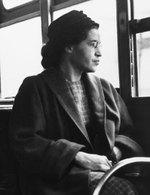
In 1955, Rosa Parks refused to give up her seat on a Montgomery (AL) bus. She was charged with disorderly conduct and violating a local ordinance. A 381-day boycott of the buses, a near bankrupting of the transit company, and a federal court decision saying such practices as segregated bus seats were unconstitutional didn't end the practice; it just made it illegal.
Although the 1954 Brown v Board of Education of Topeka decreed that segregated schools were unconstitutional, many schools remained segregated. In 1957, 9 black teens had to be escorted by Army and National Guard troops to classes at Little Rock's Central High School -- the first black students to attend school there. The troops were there to "maintain order and peace."
In 1960, four black students sat at a Woolworth's lunch counter in Greensboro, North Carolina and asked to be served. They were not. They were forced to leave when the store closed. A group of black students in Nashville, replicating the Greensboro event, were beaten by white teens and then arrested for disorderly conduct.
In 1961, black and white passengers were savagely beaten and imprisoned for riding together on buses from Washington, D.C. to cities in the Deep South in the Freedom Rides, designed to test the Supreme Court's ruling in Boynton v. Virginia (1960), which declared segregation in interstate bus and rail stations unconstitutional.
In 1962, after repeated failures to gain admittance to the University of Mississippi, James Merideth was admitted when a federal court ruled that the school could not bar a student based on race. It took 500 troops to allow him to enroll and he was continually harassed.
In 1963 Dr. King delivered his "I Have A Dream" speech in front of over 200,000 people in Washington, DC, but also in that year Civil Rights leader Medgar Evers was assassinated in Mississippi and four young girls were killed in a church bombing perpetrated by Ku Klux Klan members in Birmingham, Alabama.
The Civil Rights Act was passed and signed into law in 1964. It ended, at least in legal theory, the unequal application of voter registration requirements and racial segregation in schools, at the workplace and by facilities that served the general public. Yet when it came to registering African-American voters, discrimination continued.
In 1965, following several peaceful voting rights demonstrations (including one in which Civil Rights activist Jimmie Lee Jackson was murdered by a police officer in Marion, AL), a series of marches from Selma to Montgomery AL were initiated. The first attempt was brutally halted by state troopers and county possemen who attacked the unarmed marchers with billy clubs and tear gas. The news footage of "Bloody Sunday" galvanized the country and President Johnson announced that he was sending a voting rights bill to Congress, which later that year became the Voting Rights Act of 1965.
So what does all this long-suffering and brutality have to do with the Middlesex Twp. zoning case? It offers us a powerful lesson: we will not lose unless we quit fighting. This is true of the legal process and beyond. In 2013 the PA Supreme Court ruled that Act 13 zoning is unconstitutional, stating that shale-gas drilling is an industrial use which is incompatible with residential zoning uses. Yet township solicitors continue to ignore these admonitions, and now a county judge has done so as well. And so this case will be appealed to the Commonwealth Court and ultimately the state Supreme Court. We lose only if we quit fighting.
But it is equally true beyond the legal process. Beyond the obvious abomination of a heavy industrial use placed in a formerly quiet residential neighborhood, there is the growing evidence that shale-gas drilling is an abomination to the planet -- to the air we breathe, the water we drink, to our children, pets and wildlife and to our climatological system that is growing more out of control by the month. This abomination must be stopped.
Despite laws being passed that were designed to help protect the rights of minorities, the Civil Rights movement had to keep implementing protests and demonstrations to bring the true spirit of those laws to fruition. Our state and country may or may not pass laws to address the abomination of shale-gas drilling; it may be up to us to continue to draw attention to these hazards and keep them in the forefront of the public consciousness, just as Martin Luther King and other Civil Rights activists did with black rights issues in the '50's and '60's. We can't give up until shale-gas drilling is banned everywhere on the planet in favor of clean and renewable energy.
Make no mistake: the shale-gas protest movement is very much a civil-rights movement: our right to clean air, pure water and a healthy environment for decades to come. These rights were established by Pennsylvania's Environmental Rights Amendment -- Article I, Section 27 of the PA Constitution -- in 1970, and re-affirmed in the Robinson Township case of 2013. Like the civil rights laws of the '50's and '60's, they are being ignored. Like those brave activists and organizers, we must continue the fight. We will not lose, unless we quit fighting.
-- Michael Bagdes-Canning

 RSS Feed
RSS Feed
